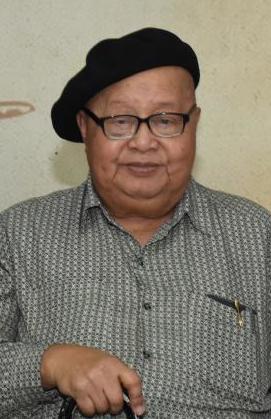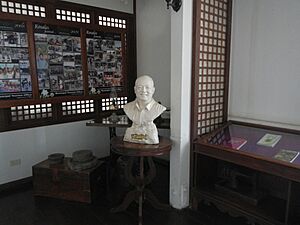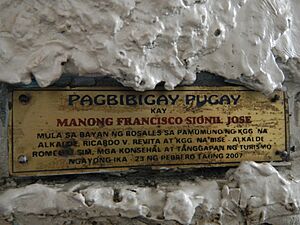F. Sionil José facts for kids
Quick facts for kids
F. Sionil José
|
|
|---|---|

José in 2017
|
|
| Born | Francisco Sionil José December 3, 1924 Rosales, Pangasinan, Philippine Islands |
| Died | January 6, 2022 (aged 97) Makati, Metro Manila, Philippines |
| Pen name | F. Sionil José |
| Occupation | Filipino Novelist, Writer, Journalist |
| Nationality | Filipino |
| Alma mater | Far Eastern University University of Santo Tomas (dropped out) |
| Period | 1962–2022 |
| Genre | Fiction |
| Literary movement | Philippine literature in English |
| Notable works | The "Rosales Saga" Novels (1962–1984) |
| Notable awards |
|
| Spouse | Tessie Jovellanos Jose |
|
|
|
Francisco Sionil José (born December 3, 1924 – died January 6, 2022) was a famous Filipino writer. He was one of the most widely read Filipino authors writing in English.
In 2001, he was named a National Artist of the Philippines for Literature. This is a very high honor given to Filipinos who have made amazing contributions to the arts. José's stories and novels often show the challenges faced by people from different social classes and how life changed under colonialism (when one country controls another). His works, originally in English, have been translated into 28 languages around the world.
Contents
Early Life and Inspirations
F. Sionil José was born in Rosales, Pangasinan, a place that became the setting for many of his stories. He grew up in Barrio Cabugawan, Rosales, where he first started writing. His family were Ilocano people who had moved to Pangasinan before he was born. They had left their home in Ilocos to escape poverty, traveling towards Cagayan Valley. Like many families moving for a better life, they carried all their belongings with them.
One of the biggest influences on José was his hardworking mother. She made sure he had books to read, even though they were poor and didn't own land. José began writing and reading in grade school. In fifth grade, his teacher opened the school library to students. This is how José discovered the novels of José Rizal, a national hero of the Philippines. Reading about characters like Basilio and Crispin in Rizal's Noli Me Tangere made young José sad because he understood injustice. When he was five, his grandfather, who was a soldier, showed him land their family used to farm. Rich landlords had taken it away because his grandfather couldn't read or write. These early experiences deeply shaped José's writing.
Writing Journey
After World War II, José attended the University of Santo Tomas but left to focus on writing and journalism in Manila. Over the years, he worked as an editor for different magazines and newspapers. He also started his own publishing company and founded the Philippine branch of PEN, a global group for writers.
José received many awards for his work. His novel The Pretenders is one of his most well-known. It tells the story of a man who feels disconnected from his humble beginnings and the wealthy family of his wife.
The life and writings of José Rizal greatly influenced José's own work. His famous five-book series, the Rosales Saga, uses ideas and characters similar to Rizal's stories. Throughout his career, José's writings always supported social justice and changes to improve the lives of ordinary Filipino families. He is highly praised by critics around the world, even though he is sometimes less recognized in his own country. This might be because he wrote in a unique Filipino English style and often shared strong opinions against the wealthy elite.
José also owned Solidaridad Bookshop in Ermita, Manila. This bookshop is known for having rare books and materials about the Philippines. It was a favorite spot for many local writers.
Later Life and Passing
F. Sionil José passed away on January 6, 2022, at the age of 97. He died at the Makati Medical Center.
Recognitions and Awards
F. Sionil José's works earned him many honors. Five of his pieces won the prestigious Carlos Palanca Memorial Awards for Literature:
- His short story The God Stealer (1959)
- Waywaya (1979)
- Arbol de Fuego (Firetree) (1980)
- His novel Mass (1981)
- His essay A Scenario for Philippine Resistance (1979)
Starting in the 1980s, José received many awards for his excellent writing and for being an outstanding Filipino in literature. In 1979, he received the City of Manila Award for Literature. The next year, he was given the important Ramon Magsaysay Award for Journalism, Literature and Creative Communication Arts. Other awards from this time include the Outstanding Fulbrighters Award for Literature (1988) and the Cultural Center of the Philippines Award for Literature (1989).
Around the year 2000, José continued to be recognized. He received the Cultural Center of the Philippines Centennial Award in 1999, the Chevalier dans l'Ordre des Arts et Lettres in 2000 (an award from France), and the Order of Sacred Treasure (Kun Santo Zuiho Sho) in 2001 (an award from Japan). In that same year, the Philippine government gave him the highest title of National Artist for Literature. In 2004, he won the Pablo Neruda Centennial Award in Chile.
Major Works
The Rosales Saga Novels
This is a series of five novels that cover three centuries of Philippine history. They have been translated into 22 languages.
- Po-on (Source) (1984)
- Tree (1978)
- My Brother, My Executioner (1973)
- The Pretenders (1962)
- Mass (1974)
Other Novels
- Gagamba (The Spider Man) (1991)
- Viajero (1993)
- Sin (1973)/(1996)
- Ben Singkol (2001)
- Ermita (1988)
- Vibora! (2007)
- Sherds (2008)
- Muse and Balikbayan: Two Plays (2008)
- Short Stories (with Introduction and Teaching Guide by Thelma B. Kintanar) (2008)
- The Feet of Juan Bacnang (2011)
Novellas
- Three Filipino Women (1992)
- Two Filipino Women (1981)
Short Story Collections
- The God Stealer and Other Stories (2001)
- Puppy Love and Thirteen Short Stories (1998)
- Olvidon and Other Stories (1988)
- Platinum: Ten Filipino Stories (1983)
- Waywaya: Eleven Filipino Short Stories (1980)
- Asian PEN Anthology (as editor) (1966)
- Short Story International (SSI): Tales by the World's Great Contemporary Writers (co-author, 1989)
Children's Books
- The Molave and The Orchid (2004)
Verses
- Questions (1988)
Essays and Non-Fiction
- In Search of the Word (1998)
- We Filipinos: Our Moral Malaise, Our Heroic Heritage (1999)
- Soba, Senbei and Shibuya: A Memoir of Post-War Japan (2000)
- Heroes in the Attic, Termites in the Sala: Why We are Poor (2005)
- This I Believe: Gleanings from a Life in Literature (2006)
- Literature and Liberation (co-author) (1988)
Works in Translation
- Zajatec bludného kruhu (The Pretenders) (Czech language, 1981)
- Po-on (Tagalog language, 1998)
- Anochecer (Littera) (Spanish language, 2003)
In Anthologies
- Tong (a short story from Brown River, White Ocean: An Anthology of Twentieth-Century Philippine Literature in English by Luis Francia, 1993)
In Film Documentaries
- Francisco Sionil José – A Filipino Odyssey by Art Makosinski (Documentary, 1996)
See also
- Philippine literature in Spanish
- Philippine literature in English
- Literature of the Philippines
- Philippine English
- Thomasites
- Philinda Rand
- Stevan Javellana
 | Sharif Bey |
 | Hale Woodruff |
 | Richmond Barthé |
 | Purvis Young |



